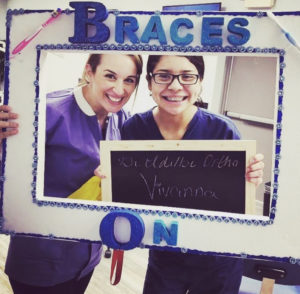
Article at a Glance
- Orthodontics is the dental specialty that focuses on treating dental or facial irregularities such as jaw growth problems, crowding of teeth, protruding teeth, trauma to the mouth and more.
- To become an orthodontist, you need to earn a college degree, complete dental school, and finish an orthodontic residency program.
- There are many different types of orthodontics treatment depending on the issues to be corrected.
Braces are common in the modern world. You probably know somebody who has them right now. Maybe you had or have braces yourself. Have you ever wondered what an orthodontist does or what is orthodontic treatment? There is a lot to know about orthodontics and we’ve got the answers!
What is Orthodontics?
Orthodontics has been a dental specialty since the early 1900s with the goal of preventing, diagnosing, and treating dental and/or facial irregularities. There are many conditions that can be treated with orthodontics. These conditions include:
- Jaw growth problems
- Congenitally missing teeth or extra teeth
- Crowding of teeth
- Protruding teeth
- Accidents or trauma to the mouth
Why are Orthodontics Important?
While orthodontics can improve self-confidence by correcting things like crooked teeth, treating and correcting these conditions is not just cosmetic. Orthodontic problems can cause many issues including hindering chewing and speaking. Some conditions can lead to tooth decay and gum disease if left untreated.
How do Orthodontics Work?
Braces apply constant pressure to the bones to gradually move the teeth. This is known as bone remodeling. The process is slow and involves shifting the teeth over time while allowing the jawbone and surrounding tissues to adjust with the changes and reform in the proper alignment.
What Does an Orthodontist Do?
Orthodontists, also known as orthodontic specialists or orthodontic and dentofacial orthopedists, are medical specialists who evaluate, diagnose, and treat dental and facial abnormalities. Not only can orthodontists treat existing issues, they can identify problems early and treat them before they fully develop which can save you a lot of time, money, and discomfort.
How Do You Become an Orthodontist?
If you hope to become an orthodontist, you’ll have to earn a college degree and then complete dental school. To specialize in orthodontics, you will have to finish an orthodontic residency program. This program involves intense, specific instruction on tooth movement and dental, jaw, and facial development. In America, orthodontists can become board-certified with the American Board of Orthodontics (ABO) after graduating from a fully accredited residency program.
Dentist vs Orthodontist: What’s the Difference?
Think about dentists and orthodontists as you would any medical specialty. Dentists and orthodontists finish dental school much like general physicians and orthopedic surgeons finish medical school. However, like an orthopedic surgeon, an orthodontist pursues specialized programs to learn more specifically how to treat orthodontic issues.
What Are My Options for Orthodontic Treatment?
Orthodontics have come a long way with technological advances. While some treatment options are preferred for some conditions, there are more choices than ever before. Depending on your orthodontic issues, you have a few options for treatment.
- Traditional, stainless steel braces are very common and allow your orthodontist a good deal of control over the course of your treatment.
- Clear ceramic braces are similar to traditional metal braces but less noticeable.
- Clear aligners, like Invisalign, consist of clear trays that are changed out, usually weekly, to gradually move teeth.
- Lingual braces are attached to the backs of teeth so they aren’t visible, however they aren’t right for everybody and have different challenges from other types of braces.
- Orthodontic appliances may also be a part of your treatment plan and some of them can even be used to break bad habits like thumb sucking.
How Do I Care for My Orthodontics?
Good oral care is crucial to the success of your orthodontic treatment. While having braces can make brushing and flossing more difficult, it’s necessary to care for your teeth to avoid problems down the line.
- Brush your teeth after you eat and before bed.
- Floss at least once per day. If this is difficult, ask your orthodontist for special tools to make it easier.
- See your dentist for regular check-ups and professional cleanings.
- Use fluoride toothpaste and possibly even a prescription rinse to help prevent decalcification of your teeth.
How Jefferson Dental Care Can Help
Jefferson Dental Care is proud to offer orthodontics treatment with affordable options so everyone can get the smile of their dreams. We offer traditional metal braces, invisible and clear braces, and Invisalign clear aligners. If you’re interested in orthodontics and wondering what your options are, contact the Jefferson Dental Care Clinic nearest you to book your free consultation!




